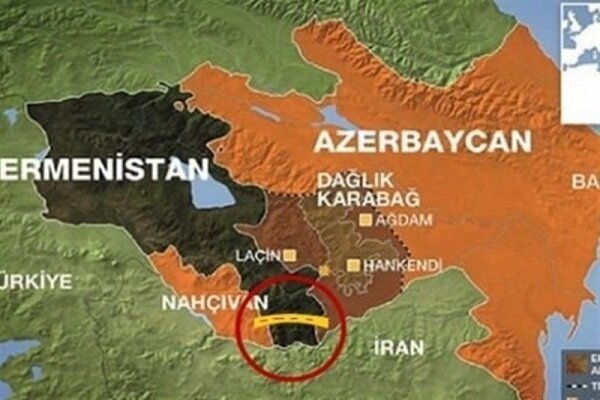US Unveils Zangezur Corridor Plan, Issues Warning to Diplomacy Department

The South Caucasus has long been a battleground for powers such as Iran, Russia, and the Ottoman Empire. Following the collapse of the Soviet Union and the independence of Azerbaijan, Armenia, and georgia, this region transformed into a global arena with increased involvement from Europe and the United States amid Nagorno-Karabakh conflicts. After Azerbaijan’s victory in the 2020 Nagorno-Karabakh war, tensions intensified over control of the Zangazur corridor connecting Azerbaijan to nakhchivan. Iran opposes this plan, while Turkic Council countries and NATO support it. The United States’ recent proposal to grant a private company 100-year control over this corridor has further complicated regional dynamics. In this context, we spoke with Ehsan Movahedian, an expert on Caucasus affairs.
Ehsan Movahedian told Mehr that recent days have witnessed significant shifts in the South Caucasus demanding attention from Iran’s diplomatic corps and media outlets.Concurrently with Azerbaijani President Ilham Aliyev’s visit to Turkey, bilateral talks took place between nikol Pashinyan & Recep Tayyip Erdoğan and also Aliyev & Erdoğan. Additionally, Pashinyan and aliyev held a five- to six-hour meeting in Abu Dhabi discussing a peace agreement.Fragmented news from these talks raises concerns as these developments directly impact Iran’s economic interests and security-perhaps leading to Tehran’s geopolitical strangulation.
Movahedian added that clashes are ongoing between Aliyev and Vladimir Putin regarding Azerbaijan’s lobbying efforts within Russia aimed at influencing Moscow’s political-security structures-with Britain and Israel reportedly involved in this effort as well-prompting Putin to crack down on Azerbaijani migrants inside Russia. Meanwhile, Azerbaijani media increasingly advocate for NATO membership for their country. Attention was drawn recently by statements from Washington’s ambassador to Turkey about leasing for 100 years a route planned for passing through Zangazur corridor under management by an American company. Armenia insists that Nakhchivan segment should be leased by this same American company-a proposal rejected by Azerbaijan. This situation carries risky consequences; it creates proximity between Iran and U.S.-led forces politically aligned with Israel and NATO along Northern Iranian borders stretching from formerly NATO-member Turkey through Nakhchivan up to Armenian-Azerbaijani frontiers.
Movahedian noted that even though U.S ambassador claims about controlling Zangazur have not been accepted officially yet ‘we must remain vigilant’ against any maneuvers concerning its establishment or governance structure changes along this route – especially since Iran opposes any geopolitical disruptions involving border adjustments or forced demographic shifts affecting Armenians ther.
He explained: “Iran rejects forced Armenian displacement from mountainous Nagorno-Karabakh as emptying those areas opens doors-as an example according to reports-to Israeli forces alongside NATO troops entering under pretexts destabilizing regional balance.”
Azerbaijan promotes migration policies; Armenia mentions figures near 300 thousand displaced individuals.
Iran voiced objections at ECO summit against proposals encouraging population transfer or demographic engineering illustrated by movements linking some residents of Azerbaijan Republic toward Armenia territory.
The expert underscored risks tied to identity manipulation: “Recently there was Joulani’s visit (known jihadist leader)to Azerbaijan which cannot be naïvely reduced only to energy negotiations since his contacts with Israeli officials hint possibilities – namely relocating syrian takfiri militants antagonistic toward each other out of Syria possibly funneling into Azerbaijani soil.” Nonetheless of their backgrounds such extremist factions pose direct threats toward Iranian interests given hostility towards Shia communities.
Movahedian recalled Supreme leader Khamenei’s directive issued autumn 2020 warning no terrorist groups should operate near Iranian borders.
“We recognize Armenia & Azerbaijan within their current internationally recognized borders; any attempts altering boundaries will prompt decisive response,” he affirmed.
The analyst continued: “Azerbaijan has pursued territorial claims over certain villages inside Armenian territory for several years including Kerkhi (known also as Tigranakert) located close to Armenian frontier adjacent transit routes connecting Iran-Armenia-Nakhchivan”. Seizure could sever vital road connections linking northern border areas across both countries while nearby strategic high ground would enhance Baku’s reconnaissance capabilities facilitating operational encirclement endangering Armenian defenses.”
Ehsan Movahedian stressed increasing cooperation with Russian & Chinese counterparts is critical since all three share aligned interests despite Moscow traditionally considering Central Caucasus part of its domain.
Azerbaijan has adopted harsher stances vis-à-vis Russia counting on backing from U.S., Israel & Turkey attempting regional leverage moves unsupported fully yet but politically sensitive nevertheless.
Politically powerful groups close to Baku tacitly endorse Washington-led initiatives creating Zangazur corridor likely prompting Kremlin shift away from passive observation toward active opposition preventing establishment without Russian role involved.
“Iran must coordinate closely with Moscow & Beijing clarifying how official formation of ‘Hebrew-NATO’ transshipment channel undermines mutual economic benefits restricting goods-energy transfers while inviting intrusive Western military presence,” he stated emphatically adding convergence among Tehran-Peking-Moscow requires reinforcement.”
The expert further warned Yerevan that enabling this corridor threatens its national survival.”
Movahedian concluded: “They intend dismantling Armenia replacing it entirely by a unified Turkic zone configured strategically against both China & Iran – rendering Yerevan an inconvenient obstacle globally among Turkic-NATO aligned players.” He described Western designs enticing Armenia through economic incentives masking long-term erasure plans potentially falsifying historical heritage converting entire country latter into mere province under pan-Turkic umbrella.”


